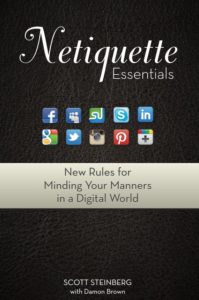Prospecting for sales or promotional leads and hunting for career-related opportunities rank among today’s most popular online activities amongst meeting planners and suppliers in every field. But which rules of conduct should you be following when reaching out regarding potential business on social networks or electronic applying for a new job at a prospective employer? As we discovered while researching new book Netiquette Essentials: New Rules for Minding Your Manners in an Online World, the answers may surprise you. Below, you’ll find several hints, tips, and inside pieces of advice on how to network more effectively online, and build your business in a positive and professional manner.
- With rare exceptions, if a prospective online contact wanted to be pitched, you would already have their email address – contacting them out of the blue on social networks with a direct sales pitch is inappropriate. Instead, look for ways you might help support an organization, effort, topic, or project that the individual stands behind, and present an offer to do so, or find other positive ways to incentivize interaction and opportunities to get to know one another. For example, you might look for positive conversation starters – e.g. asking to feature an interview with them on your company blog or send a free copy of your business’ latest book – to begin the process of relationship building. In short, always look for ways to help and assist partners: Only once you’ve built a meaningful level of trust and rapport should the topic of potential work collaborations be presented.
- Under no circumstances should you pitch a product, service, or prospective business opportunity on someone’s public wall or profile. Some users will, however, provide professional contact information on their public profile – using it to contact them may be acceptable in some cases, though reaching out via any personal contact details is not. Should you choose to email, keep communications short, and be sure to quickly get to the point, including a general summary and any key questions or queries in the first couple lines. Also be sure to include your name and contact information in all communications, and be respectful with e-mail and message signatures. Keep in mind that automatic signatures are OK, but shouldn’t be overly intrusive – a name, job title/business name, address, email address and phone number should provide enough room to get your point across. Anything more is overkill – inspirational quotes and rainbow colors included. Once you get a response to an email, remember to delete your signature before your next response as well to keep the same information from needlessly repeating multiple times as well.
- Observe the same rules of behavior in online job searches as in real-life – professional conduct, appearances and communications are imperative. What’s more, proper formalities should be observed when conducting career outreach, and care should be taken to respect the rules of grammar, punctuation and spelling. Be especially careful with regards to how communications over online and social channels may be perceived – tone of voice, expressions and subtle nuances can be lost in the translation to text.
- Bear in mind that more employers and job recruiters are turning to online search engines to research prospective partners and hires – be aware of the results that come up, including potentially damaging or embarrassing content and links. It will help you in your efforts to build and maintain a positive online reputation to post helpful, high-quality content that’s of service to others, and do so frequently, so as to surface these time-, effort-, and energy-saving pieces more visibly in online search results. You know what they say about first impressive: The more positive and helpful the content that surfaces when others take the time to research you is, the better their initial takeaway will be.
- When applying for employment, always review prospective employers’ rules for submission to determine which exact materials are being sought and how employers prefer that these materials be sent electronically. Resumes should further include keywords (specific phrases frequently used to denote job titles and descriptions, professional experience, and technical terms when performing computerized or online queries) which can help you enjoy greater visibility in search results. You can many times find these keywords (e.g. “systems administrator” vs. “IT expert”) in the job description itself. Also be aware that document formatting may not be preserved through all electronic contact methods, and preview all submissions before sending. While your resume may look polished in your word processor, errors including unwanted line breaks, poor formatting and font troubles may appear when entered into email programs or online contact forms. Don’t forget either that resumes, once sent, may be publicly viewable (including to your current boss) and – if you’ve custom tailored for multiple submissions – in a multitude of forms. Be advised that job searches conducted on work devices and computers may further be visible to your current employer.
- Before connecting with your boss on social networks, consider if you’d still want to be connected to him or her if they weren’t your boss, i.e. if you ever leave the position. In addition, remember that connecting with colleagues and supervisors online may expose you or they to information and influences that may make either party uncomfortable – be certain to understand the risk you’re taking in doing so. Prior to requesting or accepting connections from colleagues, think about material you’re apt to share as well – is it appropriate for their consumption? When posting status updates, photos or videos, or interacting online, let professionalism rule too: If it’s unsafe to say or share at the office, it’s not something you should project online.
Award-winning professional speaker Scott Steinberg is among today’s best-known trends experts and futurists, and the bestselling author of Netiquette Essentials: New Rules for Minding Your Manners in a Digital World, Make Change Work for You: 10 Ways to Future-Proof Yourself, Fearlessly Innovate, and Succeed Despite Uncertainty and Millennial Marketing: Bridging the Generation Gap. The founder of Select nightlife magazine, and host of Next Up on NewsWatch, his website is www.AKeynoteSpeaker.com.









